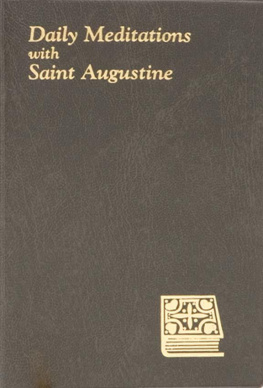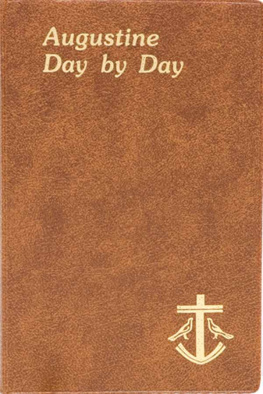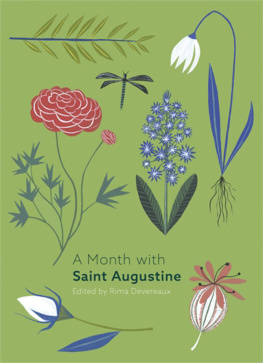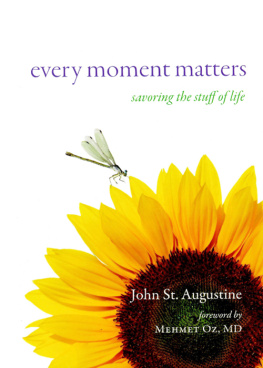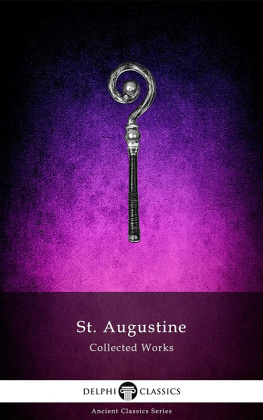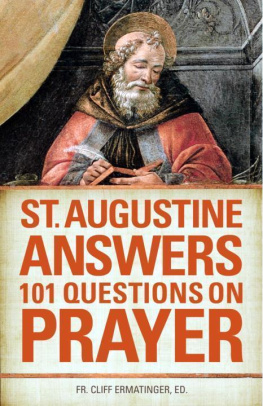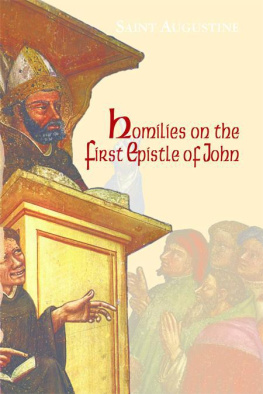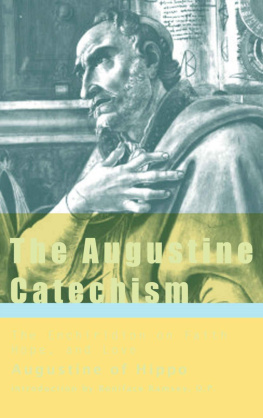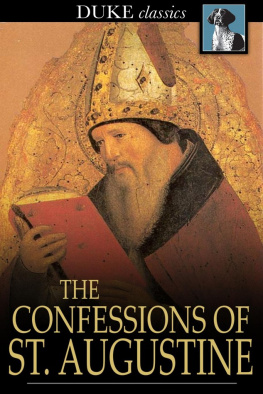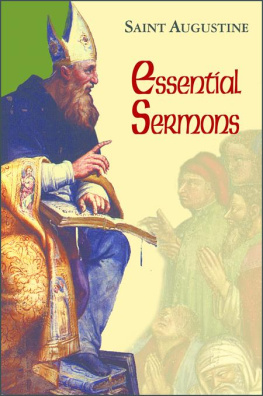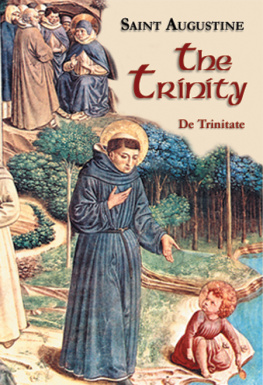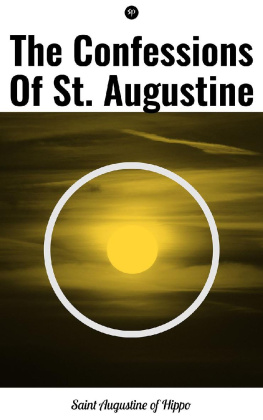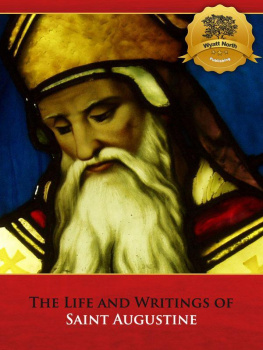John E. Rotelle - Daily Meditations with St. Augustine
Here you can read online John E. Rotelle - Daily Meditations with St. Augustine full text of the book (entire story) in english for free. Download pdf and epub, get meaning, cover and reviews about this ebook. year: 2003, publisher: Catholic Book Publishing Corporation, genre: Religion. Description of the work, (preface) as well as reviews are available. Best literature library LitArk.com created for fans of good reading and offers a wide selection of genres:
Romance novel
Science fiction
Adventure
Detective
Science
History
Home and family
Prose
Art
Politics
Computer
Non-fiction
Religion
Business
Children
Humor
Choose a favorite category and find really read worthwhile books. Enjoy immersion in the world of imagination, feel the emotions of the characters or learn something new for yourself, make an fascinating discovery.
- Book:Daily Meditations with St. Augustine
- Author:
- Publisher:Catholic Book Publishing Corporation
- Genre:
- Year:2003
- Rating:5 / 5
- Favourites:Add to favourites
- Your mark:
- 100
- 1
- 2
- 3
- 4
- 5
Daily Meditations with St. Augustine: summary, description and annotation
We offer to read an annotation, description, summary or preface (depends on what the author of the book "Daily Meditations with St. Augustine" wrote himself). If you haven't found the necessary information about the book — write in the comments, we will try to find it.
John E. Rotelle: author's other books
Who wrote Daily Meditations with St. Augustine? Find out the surname, the name of the author of the book and a list of all author's works by series.
Daily Meditations with St. Augustine — read online for free the complete book (whole text) full work
Below is the text of the book, divided by pages. System saving the place of the last page read, allows you to conveniently read the book "Daily Meditations with St. Augustine" online for free, without having to search again every time where you left off. Put a bookmark, and you can go to the page where you finished reading at any time.
Font size:
Interval:
Bookmark:
DAILY MEDITATIONS
WITH
SAINT AUGUSTINE

D AILY M EDITATIONS WITH S AINT A UGUSTINE
MINUTE MEDITATIONS FOR EVERY DAY TAKEN FROM THE WRITINGS OF SAINT AUGUSTINE

Compiled and Edited
by
John E. Rotelle, O.S.A.
Illustrated

CATHOLIC BOOK PUBLISHING CORP.
New Jersey
NIHIL OBSTAT: Rev. James M. Cafone, M.A., S.T.D.
Censor LibrorumIMPRIMATUR:  Most Rev. John J. Myers, D.D., J.C.D.
Most Rev. John J. Myers, D.D., J.C.D.
(T-l76)
2003 Catholic Book Publishing Corp., N.J.
ISBN 978-1-93791-323-6
CONTENTS
CONTENTS
INTRODUCTION
O NE of the aims of every follower of Christ is to have the mind of a Christian. In this regard, we could do no better than to follow a man who had one of the greatest minds of all time as well as one of the most Christian of mindsSt. Augustine of Hippo.
Indeed, Augustine fits our modern mentality better than any thinker of the past. Thats because he thought with his heart as well as his head. He was ever-conscious of the weakness and sinfulness of humankindnever ruling out evil and always aware that human beings could go from the heights to the depths and vice versa in quick fashion.
Moreover, Augustine knew the power of love. Indeed, he regarded it as the most powerful force in the world. More than any other ancient writer, Augustine made the law of love stand out. He reduced the whole of moral theology to charity or love: The purpose of every precept is charity, i.e., every precept is referred to love.
Augustine had the knack of forging compelling and memorable expressions. He honed his literary skills and used them to communicate the Christian thoughts of a razor-sharp mind. He was a wordsmith beyond compare!
Not only is Augustines language crystal-clear, riveting, and ever-memorable. Its Christian content is sure and unerring. After his conversion Augustine was driven more than ever by his lifelong quest for God, a quest graphically illustrated by the following legendary story.
One day Augustine came upon a little boy engrossed in filling a cup with water from the ocean and running to pour it into a hole he had made in the sand. Time after time he repeated this action, prompting the Saint to ask: What is that youre doing? The boy said: Im going to put the whole ocean into this hole.
Augustine smiled and said: Son, you cant do that. The ocean is too big for this little hole. The boy looked up with a smile and answered: Neither can you fit all of God into your tiny brain. But Augustine never stopped trying.
Augustine forged five Christian maxims that can be used to sum up the Christian mind.
1. You have made us for Yourself O Lord, and our hearts are restless till they rest in You.
Augustine eloquently taught that God is the true object of our human restlessness and insatiable quest for happiness. All human beings, in all that they do, seek God, and nothing else can satisfy their lifelong hunger for Him.
Augustine sought God in many avenues without success before realizing Who it was that he sought and receiving the grace to find Him.
Augustines oft-repeated words are a constant reminder to all of us about what our real purpose in life is. They can help us stay on the right path amid the distractions of the world.
2. Love, and do what you will.
As already mentioned, love is the most powerful force in the world. Those who truly love God will do nothing but what is pleasing to Him.
Indeed, it is well-nigh impossible for them to do what is displeasing to God. True love will find a way to do good!
Hence, it was natural for Augustine to create a phrase that can be called the ultimate Christian motto: Love, and do what you willbecause in such a case your will is necessarily in tune with the will of your Beloved, Who is God!
3. For you I am a Bishop; with you I am a Christian.
Augustine never subscribed to a laity-clergy dichotomy in his theology. His position as a Bishop was one of religious power, but he never forgot that he was as human as his people.
He was one of themengaged on the journey to the Promised Land. Just because he was a Bishop did not mean he was above the Christian struggle. He did not lord it over his people.
These are words that every Christian pastor can say to reassure his people concerning his service to them and his solidarity with them. The same is true of all Christians in authority. They are words of consolation for everyone.
4. Seek not to understand that you may believe but seek to believe that you may understand.
With these words Augustine reminds us of the supreme importance of faith in the Christian approach to life. In his view, Christian thinkers start from faith before understanding. They seek to understandbut only after believing! They then explain what they believe.
This is a particularly prized formula for Christians who walk by faith and not by sight and who practice faith seeking understanding.
5. We are an Easter people and Alleluia is our song.
Augustine appreciated the power of Christs redeeming Passion and Resurrection. So, he never let his people forget their redeemed state.
Easter turned the whole world upside down for the better. It provided untold powers for human beings and opened up a future of eternal bliss for those who want to attain it.
All who dwell on this magnificent Christian destiny can only exclaim Alleluia (Praise the Lord) and exult in being an Easter people!
This little book of minute meditations and prayers from the works of St. Augustine was put together by Father John Rotelle, a devoted follower of Christ and Augustine, although he did not live to see the final product. He intended it to be a companion volume to Augustine Day by Day, which we published in 1985.
May it serve to fashion more dedicated followers of Augustine and therefore of Christ, the Lord Whom both Father Rotelle and St. Augustine followed so closely in their lives on earth.
The Publishers
JANUARY
Mother of God
JESUS already was before He was made and, being almighty, He was able to be made while remaining what He was. He made a Mother for Himself while still with the Father and, when He was made from His Mother, He remained in the Father.
How could He cease to be God on beginning to be Man when He enabled His Mother not to cease to be a Virgin when she gave Him birth?
Sermon 186, 1
P RAYER. You are the one, eternal, true substance, O God, in which there is perfect harmony, perfect charity, perfect life.
Soliloquies I, 1, 3
Be in Attendance at the Manger
THE inn was crowded so He was wrapped in rags, laid in a manger. The One Who filled the universe could find no room in a lodging house; laid in a feeding-trough, He became our food.
Let the two animals approach the manger, the two peoples. The ox, you see, recognizes its owner, and the donkey its masters manger. Be in attendance at the manger; dont be ashamed of being the Lords donkey!
Sermon 189, 4
P RAYER. I am not now asking for earthly goods, O God, for I have learned from Your new covenant what holier things to desire.
Next pageFont size:
Interval:
Bookmark:
Similar books «Daily Meditations with St. Augustine»
Look at similar books to Daily Meditations with St. Augustine. We have selected literature similar in name and meaning in the hope of providing readers with more options to find new, interesting, not yet read works.
Discussion, reviews of the book Daily Meditations with St. Augustine and just readers' own opinions. Leave your comments, write what you think about the work, its meaning or the main characters. Specify what exactly you liked and what you didn't like, and why you think so.

